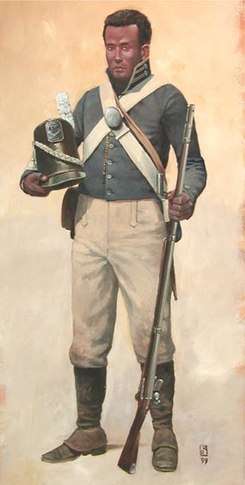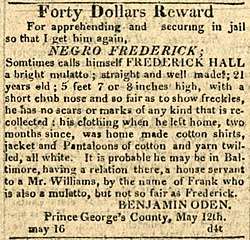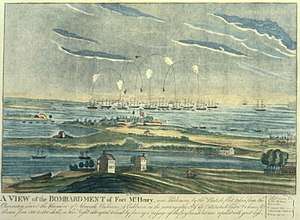William Williams (soldier)
Born Frederick Hall who used the alias William Williams as a runaway African American slave who enlisted as a private in the U.S. Army during the War of 1812 and who died from a mortal wound while defending Fort McHenry from the British naval bombardment in 1814.[1]
William Williams | |
|---|---|
 William Williams wearing a U.S. Army uniform during the War of 1812 | |
| Born | Frederick Hall c. 1793 |
| Died | September 13, 1814 (aged 21) Baltimore, Maryland |
| Occupation | slave, soldier |
| Military career | |
| Allegiance | |
| Service/ | |
| Years of service | 1814 |
| Rank | private |
| Battles/wars | War of 1812
|
Early life


U.S. Army service in War of 1812
He escaped his master from Bellefields Plantation (Sim's Delight), Croom, Prince George's County, Maryland in early 1814; despite the standing British offer of freedom and land to any escaped slave who joined the British army or navy, Williams enlisted in the United States Army in mid 1814. He was assigned to the 38th U.S. Infantry in Baltimore and received an enlistment bonus of $50, and wages of $8 per month.
Death
In September 1814, during the British artillery bombardment on Fort McHenry, Private William Williams was mortally wounded when a cannonball blew off his leg. He died two months later in a Baltimore hospital.
See also
References
- A Black Soldier Defends Fort McHenry, Library Field Guide No. 1, Fort McHenry National Monument and Historic Shrine Maryland, National Park Service U.S. Department of the Interior